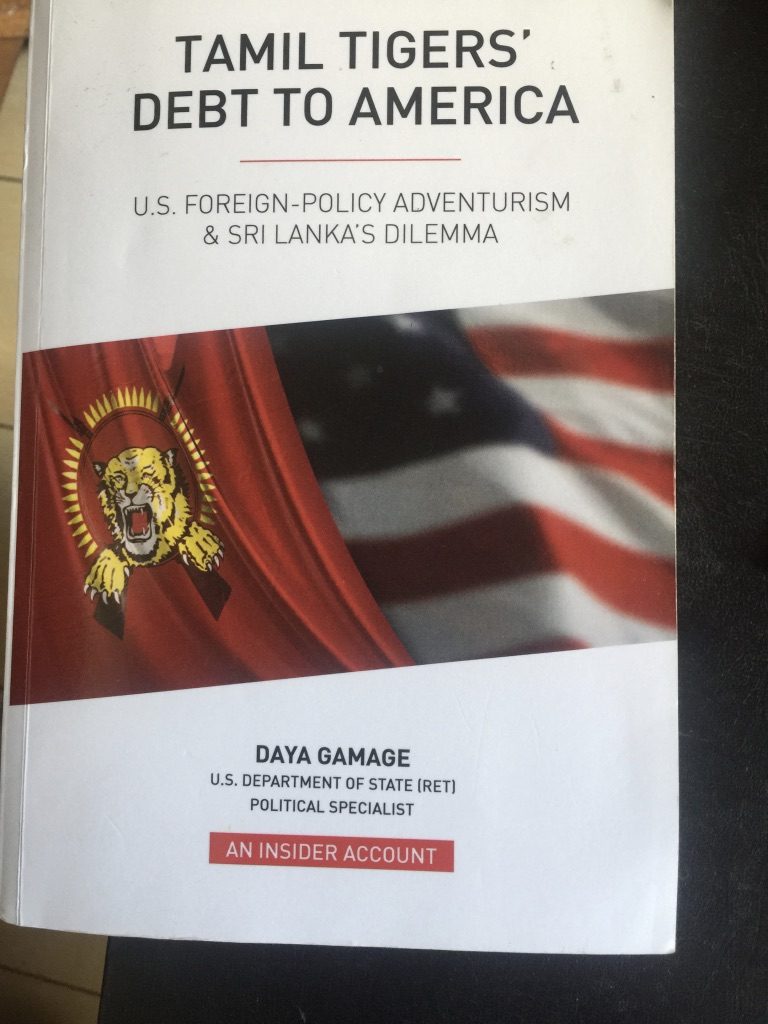Daya Gamage worked at the American Embassy in Colombo, as the Sole Foreign Service National and as a Political Specialist with Dr Robert Boggs, who served as Professor of South Asian Studies at Near East South Asia Centre for Strategic Studies at the US National Defence University, from 1989 to 1993. Dr Boggs was the Foreign Service Political Counsellor while Daya Gamage was the Foreign Service National Political Specialist. Both of them were the Colombo US Diplomatic Mission’s key persons who closely monitored the Southern (JVP-88-89) insurrection and the North’s LTTE separatist-terrorist movement for the U.S. State Department. Daya Gamage retired in 1994 and has been living in Las Vegas ever since. Sharing his knowledge, understanding and his intimate professional relationship with the US Department of State, he has come out in the form of a book titled: “Tamil Tigers’ Debt to America.” He assures that facts found in his book cannot be found anywhere else! Daya Gamage authorised the writer to ” to quote anything from his book” so that the readers may get a clear picture of America’s Foreign Policy, Sri Lanka’s National issues and the LTTE struggle in depth. His book is available at Amazon.
The final episode on Tamil Tigers’ Debt to America by Daya Gamage in Ceylon Today newspaper. But it will continue in the writer’s blog: http:www.tilaksblog.com
On the 6th of February, 2007, during the period when the Government of Sri Lanka was engaged in the military offensive against the Tigers, and on 1st of January, 2009, at the time the military was approaching the final assault, the policy statements made by the USG, clearly provided what positions the United States took on the overall situation in Sri Lanka.
In both policy pronouncements, the American diplomatic representative in Colombo, Ambassador Robert Blake displayed how candid he was about the battle between the GSL and the LTTE. These sentiments were linked to the developed American perspective.


Ambassador Blake spoke to C.A.Chandraprema about the LTTE, the nature of the Sri Lankan conflict, the confidence shown by expatriate Tamils in Sri Lanka’s long-term prospects and the possibility of a political settlement in Sri Lanka (http://tamilweek.com/news-features/archives/995).
His interview with the Sri Lanka newspaper the Island on February 6, 2007, characterised the Sri Lanka problem as follows:
The Island Newspaper interview
“ The problem is that terrorism exists because of the failure of successive governments to address the grievances that have given rise to terrorism in the first place. That is why we advocate a political solution to the problem and not a military solution. Almost every Tamil that I speak to wants a federal solution within a united Sri Lanka. They do not want a separate Eelam. One of the arguments against any kind of negotiations is that Prabhakaran will never agree to anything less than an independent state. I don’t believe that’s true. I believe that there is great pressure on the LTTE to agree so some sort of Federal solution or a power-sharing proposal with a united Sri Lanka. The overwhelming majority of Tamils here and overseas will support such a solution.”
When the Island staffer Chandraprema noted:
“ The problem with the APRC is that whatever problem that they come up with, has to be acceptable to the LTTE. They are the people who decide. Ambassador Blake in his reply said thus:
Robert Blake’s comments to The Island Staffer.

“ I wouldn’t blame the LTTE. I think the first challenge before the APRC is the consensus power-sharing proposal that is widely acceptable to all the Tamil people. Don’t worry about the LTTE in my view. You should try to come up with something that will attract the support of the broad majority of the Tamil people, both inside the country and outside the country. If you have their support, they will be able to exert a lot of pressure on the LTTE and Prabhakaran to accept a credible proposal.”
With that mindset, Ambassador Robert Blake, in an interview with Daily Mirror said on the 1st of January 2009, how the US government’s strong belief of the indispensability of the Tamil Tiger movement. This was four and a half months before the Government of Sri Lanka annihilated the Tigers, killing its top cadre, which included its leader Velupillai Prabhakaran. Robert Blake further declared the following
“ We have always believed that it was going to be difficult to defeat the LTTE. At some point, the Government of Sri Lanka will have to hold talks to persuade the LTTE to lay down arms because it will be impossible to defeat them completely by military means alone. A total ban on the LTTE would make this difficult. Whether the Government negotiates or not is another matter, but that’s up to them to decide. They (GSL) don’t plan to at this time. At some point, it’s important that government talks to a representative sample of non-LTTE Tamils to work out a solution. Once you achieve that support you can isolate the LTTE.
Robert Blake’s answer to the Journalist’s question
Is the political solution possible followed by a military defeat?
RB: The point I am trying to make is that it is going to be difficult to win a military solution. Unless there is a political solution on the table, the incentives will be there for people to continue to support the LTTE both inside and outside the country. If the Government were to undertake a political solution now, the Tamil and Muslim people would find credible that would assist undercut help for the LTTE and hasten their end and thereby help the GSL.
When the LTTE’s imminent defeat was seen during the final months of the battle, the United States desired an existence of an and controlled separatist group in Sri Lanka’s political mainstream as a catalyst to bring solutions to Tamil grievances rather than its total annihilation. To the State Department officials, total annihilation of the LTTE helps maintain the “ supremacy of the Sinhalese race” in Sri Lanka’s overall system, a trend the United States was critical for many decades.
Daya Gamage has documented in chapter five in his book titled: “ Tamil Tigers’ Debt to America,” in detail how the United States made a file effort to save the leaders of the Tamil Tigers and airlift them to a distant location.
End of the series: “ Tamil Tigers’ Debt to America” by Daya Gamage.
Writer’s Note: To serialise the entire book on a weekly basis, which contains 577 pages, even as extracts in a column with limited space, is an impossibility. Those readers who are keen on reading about America’s Foreign Policy, Sri Lanka’s National issues and the LTTE struggle in-depth could be conversant with facts by reading the entire book, which is available at Amazon.com. The ISBN Nos. 1537053485 & ISBN 13:9781537053486. However, the series will continue in the writer’s blog: http:www.tilaksblog.com






